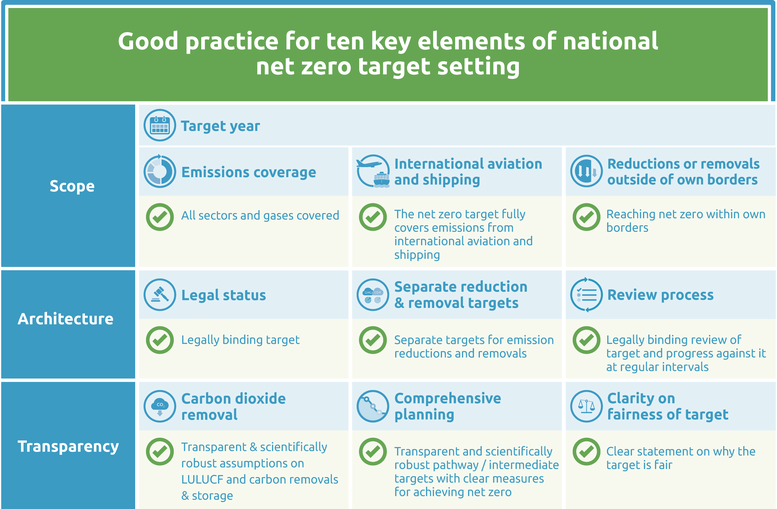Net zero targets
Summary
We evaluate the net zero target as: Target information incomplete
In November 2021, Nigeria passed the Climate Change Bill that includes a net zero target for 2050 to 2070 (Okereke & Onuigbo, 2021). The bill includes provisions to set five-year carbon budgets under a National Climate Change Action Plan to be ratified by the Federal Executive Council. The Federal Ministry of Environment is tasked with setting the carbon budgets, while the National Council on Climate Change, established by the bill, will oversee implementation.
Nigeria’s final NDC update of July 2021 mentioned the government’s aim to cut current emissions by 50% by 2050 and achieve net zero emissions ‘as early as possible in the second half of the century’ (Federal Government of Nigeria, 2021). At COP26, President Buhari further committed to net zero emissions by 2060 (Lo, 2021). Nigeria has also launched a long-term vision to 2050, which is expected to inform the development of their Long-Term Low Emission Development Strategy (Akinola, 2021).
While Nigeria has passed the target into law with the passage of the Climate Change Bill, the text of the law is not yet available so most elements of the target cannot be assessed. We therefore evaluate the target as “Target information incomplete”.
Ten key elements
Scope
- Target year – Nigeria’s Climate Change Bill aims to achieve net zero emissions between 2050 and 2070 (Lo, 2021). At COP26, President Buhari committed to achieving net zero by 2060 and Nigeria’s NDC update aims to reach net zero as early as possible in the second half of the century. We evaluate Nigeria’s target year as 2050-2070 as this target is passed into law.
- Emissions coverage – Nigeria provides no information on the target’s emission coverage.
- International aviation and shipping – Nigeria provides no information on its intention to cover international aviation and shipping.
- Reductions or removals outside of own borders – Nigeria provides no information on its intention to use international offset credits to meet its net zero target
Target architecture
- Legal status – In November 2021, Nigeria passed the Climate Change Bill, which includes the net zero target for 2050-2070. As of now, Nigeria has not submitted a long-term strategy (LTS) to the UNFCCC but has launched their Long-Term Vision meant to inform the development of their Long-Term Low Emissions Development Strategy (Akinola, 2021).
- Separate reduction & removal targets – Nigeria provides no information on its intention to communicate separate emission reduction and removal targets.
- Review process – Nigeria provides no information on its intention to establish a review cycle for its net zero and intermediate targets.
Transparency
- Carbon dioxide removal –Nigeria’s provides no information on its intention to communicate transparent assumptions on domestic carbon dioxide removals to meet its net zero target. Nigeria’s Climate Change Bill, however, includes text on the promotion of nature-based solutions, the establishment of a REDD+ Registry and development of natural capital accounts to be used by government bodies in policy and action plan formulation in line with the carbon budget (GLOBE, 2021).
- Comprehensive planning – Nigeria’s Climate Change Bill includes provisions to develop a National Climate Change Action Plan to be ratified by the Federal Executive Council that will be overseen by the National Council on Climate Change, established by the bill (Okereke & Onuigbo, 2021). The law also requires the Federal Ministry of Environment to set five-year carbon budgets that will be broken down to the annual carbon budget for each of the years that make up the five-year cycles (Lo, 2021).
- Clarity on fairness of target – Nigeria provides no information on its intention to explain the target’s fairness.
Good practice
The Climate Action Tracker has defined the following good practice for all ten key elements of net zero targets. Countries can refer to this good practice to design or enhance their net zero targets.
Further analysis
Country-related publications
Stay informed
Subscribe to our newsletter


